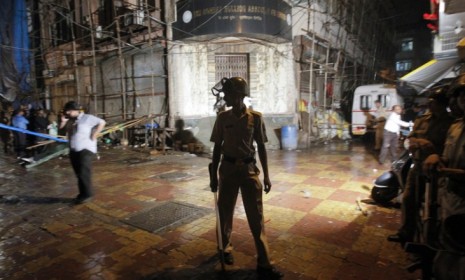The Mumbai attacks: 4 predictions
Three blasts ripped through India's largest city on Wednesday, killing at least 17 people. How will this bloodshed affect South Asia's fragile stability?

A free daily email with the biggest news stories of the day – and the best features from TheWeek.com
You are now subscribed
Your newsletter sign-up was successful
In a span of minutes during rush hour on Wednesday, three bombs tore through three different neighborhoods in Mumbai, India's financial capital, killing at least 17 people and injuring 131 others. It is the worst attack on India since terrorists' coordinated shooting attacks in Mumbai in November 2008. That strike, by the Pakistan-based group Lashkar-e-Taiba (LeT), killed 164 people. This time around, India isn't pointing fingers yet, instead looking at "every possible hostile group." But as the investigation goes on, how will this attack affect life in India, and the democracy's already tense relations with neighborhing Pakistan? Here, four predictions:
1. India, Pakistan, and the U.S. are in for a rough patch
There's no proof yet that Pakistan is responsible for this attack, says Tony Karon at TIME, but the motive "for LeT or any other Pakistan-based jihadist group to launch a new strike on Mumbai is plain to see." If this plays out like the aftermath of the 2008 attacks, the reasonable suspicion that LeT is behind the bombings would sink newly restarted India-Pakistan peace talks. Pakistan would then abandon its fight against the Taliban and Islamist insurgents so it could amass troops along the India border. That would certainly worsen Pakistan's troubled relations with the U.S.
The Week
Escape your echo chamber. Get the facts behind the news, plus analysis from multiple perspectives.

Sign up for The Week's Free Newsletters
From our morning news briefing to a weekly Good News Newsletter, get the best of The Week delivered directly to your inbox.
From our morning news briefing to a weekly Good News Newsletter, get the best of The Week delivered directly to your inbox.
2. Actually, the attacks will help mend India-Pakistan ties
If Pakistani militants are to blame, they "will have done themselves less of a favor than immediately meets the eye," says James M. Dorsey in Al Arabiya. Yes, LeT involvement would initially "bring Indian-Pakistani relations to a breaking point," and drive a bigger wedge between the U.S. and Pakistan. But hitting rock bottom might be just the catalyst Pakistan needs to "clean up its act and once and for all break its ties to militant groups." That would actually save the peace talks, says Lisa Curtis at The Foundry. And given the volatile mess in Pakistan, "Indian leaders may be loath to escalate tensions" right now, too.
3. India will face a growing, homegrown terror problem
This attack has all the hallmarks of a strike by "homegrown Islamist outfit" Indian Mujahideen (IM), not LeT, say Adam Roberts and Patrick Foulis at The Economist. But that's worrying, too. Indian intelligence has long feared that young Indian Muslims are becoming radicalized, and whether the IM "terrorists have connections abroad or not, there can be no doubt that India has become the unfortunate site of a kind of front-line" in the global war with Islamist terrorism.
A free daily email with the biggest news stories of the day – and the best features from TheWeek.com
4. The attack will change nothing
Mumbai has been hit by many terrorist attacks in the past decade, and despite stepped-up security after the 2008 attacks, "Mumbai and most Indian cities remain vulnerable," says Prashant Agrawal at The Wall Street Journal. We know that, and it's an accepted part of life. "The charade of security is as much as we can expect or, frankly, tolerate." Jam-packed cities in the world's largest democracy are too populous and on-the-move for airport-like security checks. So after terrible attacks, "we mourn the dead," then get back to living. "Not much can change that."